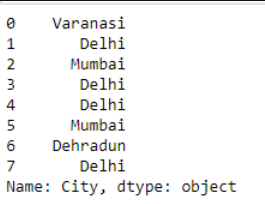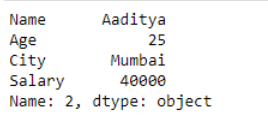How to Select Rows and Columns in Panda?
- The Tech Platform

- Nov 10, 2022
- 4 min read
This article will teach us how to select Rows and Columns in Panda using [], loc, iloc.

Indexing in Pandas means selecting rows and columns of data from a Dataframe. It can be selecting all the rows and the particular number of columns, a particular number of rows, and all the columns or a particular number of rows and columns each. Indexing is also known as Subset selection.
The difference between loc[] vs iloc[] is described by how you select rows and columns from pandas DataFrame.
loc[] is used to select rows and columns by Names/Labels
iloc[] is used to select rows and columns by Integer Index/Position. zero based index position.
One of the main advantages of pandas DataFrame is the ease of use. You can see this yourself when you use loc[] or iloc[] attributes to select or filter DataFrame rows or columns. These are mostly used attributes in pandas DataFrame. Let’s see the usage of these before jumping into differences and similarities.
Create Database
Creating the Database with column names: "Name", "Age", "City", and "Salary".
# import pandas
import pandas as pd
# List of Tuples
employees = [('Stuti', 28, 'Varanasi', 20000),
('Saumya', 32, 'Delhi', 25000),
('Aaditya', 25, 'Mumbai', 40000),
('Saumya', 32, 'Delhi', 35000),
('Saumya', 32, 'Delhi', 30000),
('Saumya', 32, 'Mumbai', 20000),
('Aaditya', 40, 'Dehradun', 24000),
('Seema', 32, 'Delhi', 70000)
]
# Create a DataFrame object from list
df = pd.DataFrame(employees,
columns =['Name', 'Age',
'City', 'Salary'])
# Show the dataframe
dfOutput:

Select Column by Name using []
The [] is used to select the column by mentioning the column name.
Example:
Select Single Column
# import pandas
import pandas as pd
# List of Tuples
employees = [('Stuti', 28, 'Varanasi', 20000),
('Saumya', 32, 'Delhi', 25000),
('Aaditya', 25, 'Mumbai', 40000),
('Saumya', 32, 'Delhi', 35000),
('Saumya', 32, 'Delhi', 30000),
('Saumya', 32, 'Mumbai', 20000),
('Aaditya', 40, 'Dehradun', 24000),
('Seema', 32, 'Delhi', 70000)
]
# Create a DataFrame object from list
df = pd.DataFrame(employees,
columns=['Name', 'Age',
'City', 'Salary'])
# Using the operator []
# to select a column
result = df["City"]
# Show the dataframe
resultOutput:

Select Multiple Column
# import pandas
import pandas as pd
# List of Tuples
employees = [('Stuti', 28, 'Varanasi', 20000),
('Saumya', 32, 'Delhi', 25000),
('Aaditya', 25, 'Mumbai', 40000),
('Saumya', 32, 'Delhi', 35000),
('Saumya', 32, 'Delhi', 30000),
('Saumya', 32, 'Mumbai', 20000),
('Aaditya', 40, 'Dehradun', 24000),
('Seema', 32, 'Delhi', 70000)
]
# Create a DataFrame object from list
df = pd.DataFrame(employees,
columns =['Name', 'Age',
'City', 'Salary'])
# Using the operator [] to
# select multiple columns
result = df[["Name", "Age", "Salary"]]
# Show the dataframe
result
Output:

Select Rows by Name using loc
The loc[] function selects the data by labels of rows or columns. It can select a subset of rows and columns.
Example:
Select Single Row
# import pandas
import pandas as pd
# List of Tuples
employees = [('Stuti', 28, 'Varanasi', 20000),
('Saumya', 32, 'Delhi', 25000),
('Aaditya', 25, 'Mumbai', 40000),
('Saumya', 32, 'Delhi', 35000),
('Saumya', 32, 'Delhi', 30000),
('Saumya', 32, 'Mumbai', 20000),
('Aaditya', 40, 'Dehradun', 24000),
('Seema', 32, 'Delhi', 70000)
]
# Create a DataFrame object from list
df = pd.DataFrame(employees,
columns =['Name', 'Age',
'City', 'Salary'])
# Set 'Name' column as index
# on a Dataframe
df.set_index("Name", inplace = True)
# Using the operator .loc[]
# to select single row
result = df.loc["Stuti"]
# Show the dataframe
resultOutput:

Select Multiple Rows
# import pandas
import pandas as pd
# List of Tuples
employees = [('Stuti', 28, 'Varanasi', 20000),
('Saumya', 32, 'Delhi', 25000),
('Aaditya', 25, 'Mumbai', 40000),
('Saumya', 32, 'Delhi', 35000),
('Saumya', 32, 'Delhi', 30000),
('Saumya', 32, 'Mumbai', 20000),
('Aaditya', 40, 'Dehradun', 24000),
('Seema', 32, 'Delhi', 70000)
]
# Create a DataFrame object from list
df = pd.DataFrame(employees,
columns =['Name', 'Age',
'City', 'Salary'])
# Set index on a Dataframe
df.set_index("Name",
inplace = True)
# Using the operator .loc[]
# to select multiple rows
result = df.loc[["Stuti", "Seema"]]
# Show the dataframe
resultOutput:

Select Rows by Index using iloc
The iloc[ ] is used for selection based on position. It is similar to loc[] indexer but it takes only integer values to make selections.
Example
Select Single Row.
# import pandas
import pandas as pd
# List of Tuples
employees = [('Stuti', 28, 'Varanasi', 20000),
('Saumya', 32, 'Delhi', 25000),
('Aaditya', 25, 'Mumbai', 40000),
('Saumya', 32, 'Delhi', 35000),
('Saumya', 32, 'Delhi', 30000),
('Saumya', 32, 'Mumbai', 20000),
('Aaditya', 40, 'Dehradun', 24000),
('Seema', 32, 'Delhi', 70000)
]
# Create a DataFrame object from list
df = pd.DataFrame(employees,
columns =['Name', 'Age',
'City', 'Salary'])
# Using the operator .iloc[]
# to select single row
result = df.iloc[2]
# Show the dataframe
result
# import pandas
import pandas as pd
# List of Tuples
employees = [('Stuti', 28, 'Varanasi', 20000),
('Saumya', 32, 'Delhi', 25000),
('Aaditya', 25, 'Mumbai', 40000),
('Saumya', 32, 'Delhi', 35000),
('Saumya', 32, 'Delhi', 30000),
('Saumya', 32, 'Mumbai', 20000),
('Aaditya', 40, 'Dehradun', 24000),
('Seema', 32, 'Delhi', 70000)
]
# Create a DataFrame object from list
df = pd.DataFrame(employees,
columns =['Name', 'Age',
'City', 'Salary'])
# Using the operator .iloc[]
# to select single row
result = df.iloc[2]
# Show the dataframe
resultOutput:

Select Multiple Rows
# import pandas
import pandas as pd
# List of Tuples
employees = [('Stuti', 28, 'Varanasi', 20000),
('Saumya', 32, 'Delhi', 25000),
('Aaditya', 25, 'Mumbai', 40000),
('Saumya', 32, 'Delhi', 35000),
('Saumya', 32, 'Delhi', 30000),
('Saumya', 32, 'Mumbai', 20000),
('Aaditya', 40, 'Dehradun', 24000),
('Seema', 32, 'Delhi', 70000)
]
# Create a DataFrame object from list
df = pd.DataFrame(employees,
columns=['Name', 'Age',
'City', 'Salary'])
# Using the operator .iloc[]
# to select multiple rows
result = df.iloc[[2, 3, 5]]
# Show the dataframe
resultOutput:

Resource: geeksforgeeks.org
The Tech Platform




Comments